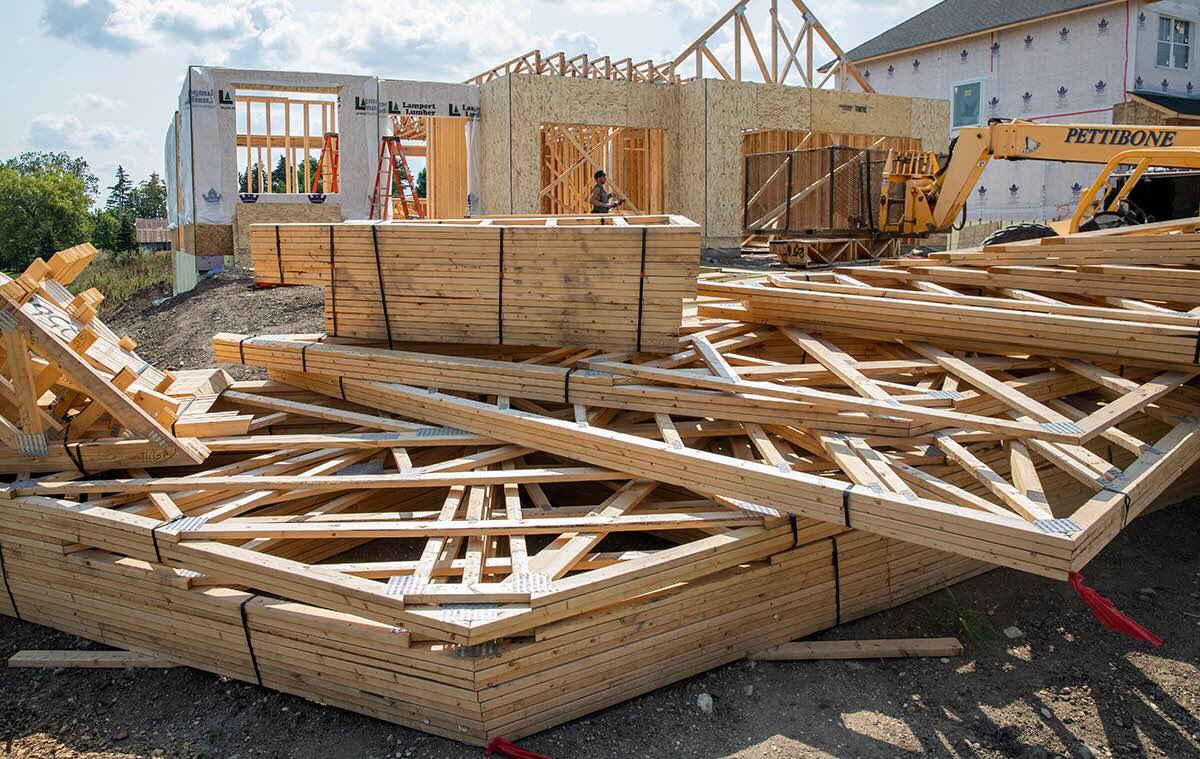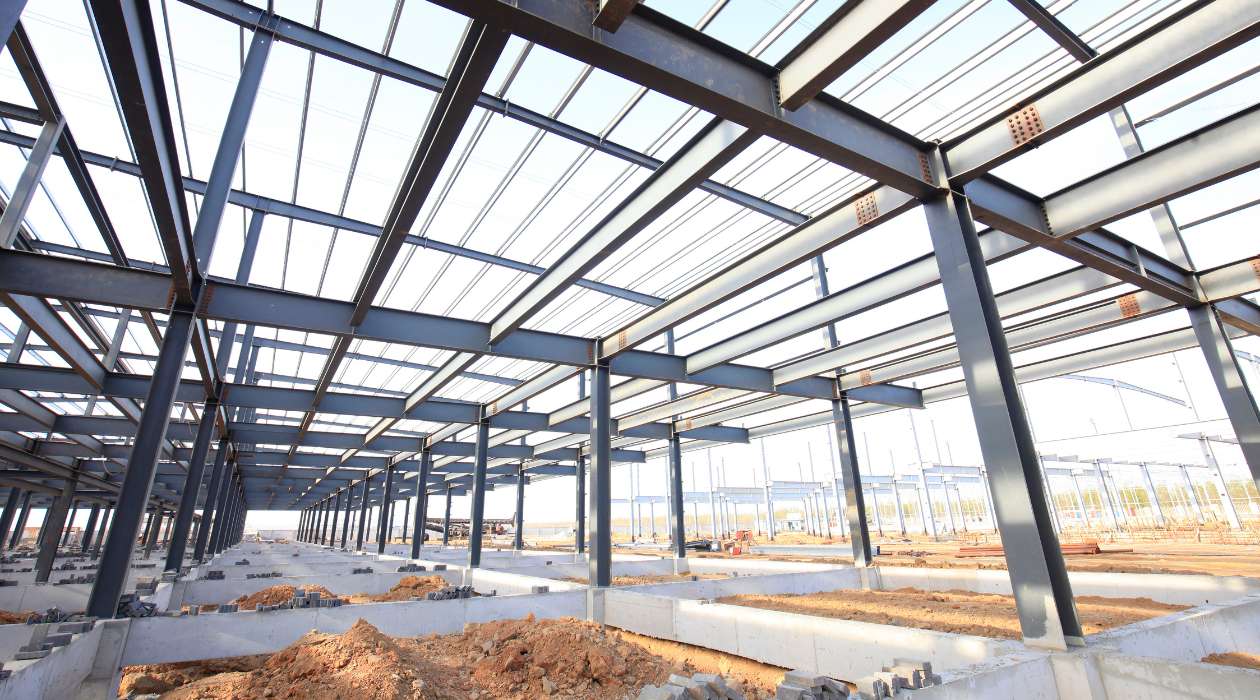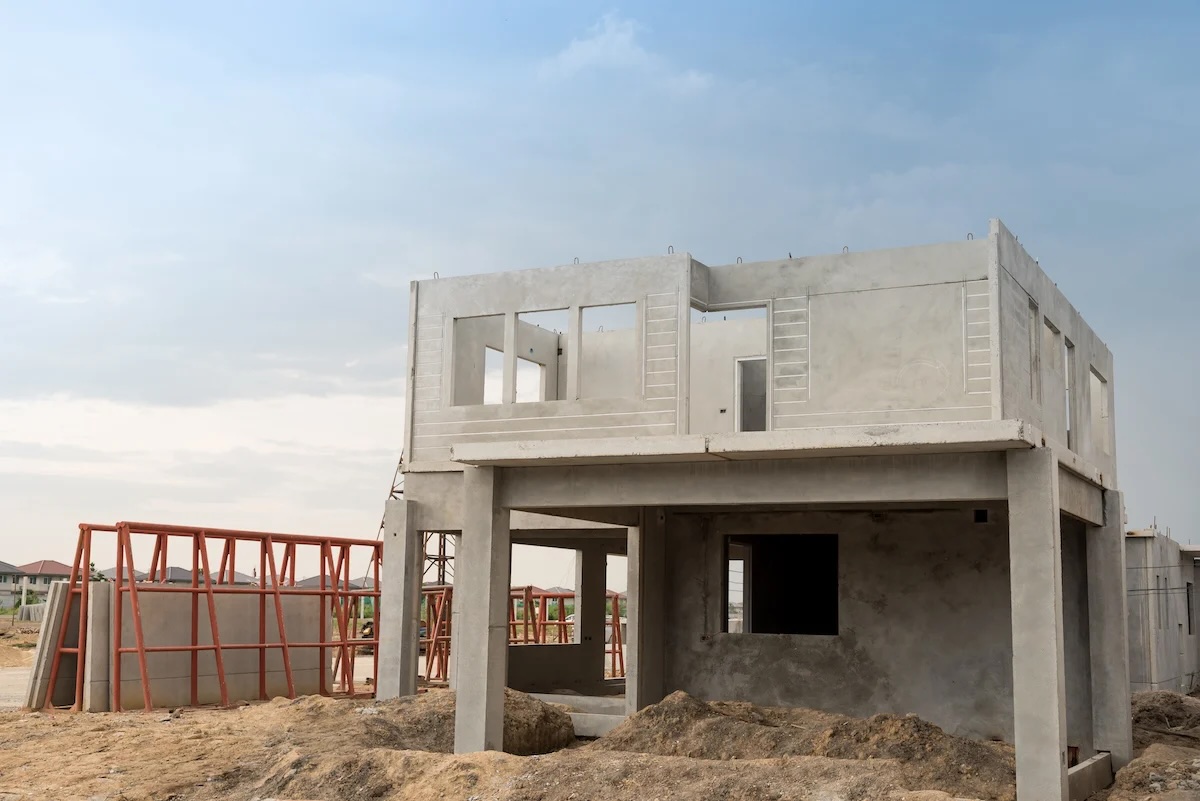Home>diy>Building & Construction>What Type Of Construction Is Most Profitable


Building & Construction
What Type Of Construction Is Most Profitable
Modified: October 20, 2024
Discover the most profitable type of building construction that can skyrocket your revenue. Learn about the key factors to consider and make informed decisions for your construction business.
(Many of the links in this article redirect to a specific reviewed product. Your purchase of these products through affiliate links helps to generate commission for Storables.com, at no extra cost. Learn more)
Introduction
Construction is a dynamic and thriving industry that plays a vital role in shaping our built environment. From residential homes to commercial buildings and infrastructure projects, construction projects come in all shapes and sizes. One important factor that any construction company needs to consider is profitability. Maximizing profits is crucial for the long-term success and growth of a construction business. However, not all types of construction projects are created equal when it comes to profitability.
In this article, we will explore the different types of construction and analyze which type tends to be the most profitable. While profitability can vary depending on various factors such as location, market demand, and project scale, we will outline the general trends and factors that contribute to profitability in each category.
Let’s dive into the factors that affect profitability in construction and explore the different types of construction projects.
Key Takeaways:
- Residential construction offers profitability through consistent market demand, customization options, and long-term investment opportunities, despite challenges such as location and material costs.
- Specialized construction projects provide lucrative opportunities for construction companies with unique skills, brand enhancement, and long-term service contracts, while navigating challenges such as complex regulations and safety requirements.
Factors Affecting Profitability in Construction
Several key factors influence the profitability of construction projects. Understanding these factors is crucial for construction companies to optimize their operations and make informed decisions. Here are some of the primary factors that affect profitability in construction:
- Market Demand: The level of demand for construction services in a particular market can significantly impact profitability. High demand and limited competition can lead to higher profit margins, while saturated markets with intense competition may squeeze profit margins.
- Project Scale and Complexity: The scale and complexity of a construction project can also influence profitability. Large-scale projects often come with higher profit potential but also higher risks and overhead costs. Complex projects may require specialized expertise, which can impact profit margins.
- Contract Type: The type of contract entered into for a construction project can impact profitability. Lump sum contracts provide a fixed price for the project, while cost-plus contracts allow for additional compensation for unforeseen expenses. The terms and conditions of the contract can impact profit margins.
- Efficient Project Management: Effective project management is essential to maximize profitability. Efficient allocation of resources, streamlining of processes, and proactive risk management can all contribute to higher profit margins. Project delays, rework, and cost overruns can negatively impact profitability.
- Material and Labor Costs: The cost of materials and labor is a significant factor in profitability. Fluctuations in material prices and availability can impact project costs and profit margins. Efficient labor management, including productivity and skillful workforce scheduling, can help balance labor costs and maintain profitability.
- Effective Cost Estimation: Accurate cost estimation is critical to profitability. Thorough examination of project requirements, accurate quantity takeoffs, and consideration of unforeseen expenses can help in preparing realistic cost estimates. Underestimating costs can lead to profit losses, while overestimating costs may result in losing out on potential contracts.
- Technological Advancements: Embracing technology and innovative construction methods can enhance efficiency and profitability. Adopting Building Information Modeling (BIM), advanced project management software, and automation can streamline processes, reduce errors, and minimize costs, thereby improving profit margins.
It’s important to note that these factors interact with each other, and their significance can vary depending on the specific project and market conditions. Construction companies must assess and adapt to these factors to maximize their profitability.
Type 1: Residential Construction
Residential construction involves the construction of single-family homes, townhouses, condominiums, and apartment buildings. This type of construction caters to the housing needs of individuals and families, aiming to create comfortable and functional living spaces. Residential construction projects vary in scale, ranging from small custom homes to large housing developments.
Residential construction offers unique opportunities for profitability. Here are some key factors that contribute to its profitability:
- Market Demand: The demand for residential properties is typically consistent, especially in growing urban areas. The need for housing presents opportunities for construction companies to generate a steady stream of projects and potential profits.
- Scale and Efficiency: Residential projects often involve multiple units, allowing for economies of scale. Construction companies can streamline the building process and benefit from efficiencies in materials procurement, labor allocation, and management, leading to better profit margins.
- Customization and Upgrades: Residential construction often involves customization and upgrades based on the buyers’ preferences. This allows for potential upselling and additional revenue streams through offering premium finishes, smart home technology, and energy-efficient solutions.
- Long-Term Investment Opportunities: Residential properties can provide long-term investment opportunities, such as renting out apartments or selling houses at a higher value in the future. This potential for appreciation can contribute to the profitability of residential construction.
- Trends and Design Preferences: Consumer demand for specific design trends and features can drive profitability in residential construction. Staying updated with the latest design trends and offering desirable amenities can differentiate a construction company and attract buyers willing to pay a premium.
While residential construction offers the potential for profitability, there are also considerations that can affect profit margins. Factors such as location, land acquisition costs, regulatory requirements, and construction material prices can impact the overall profitability of residential projects. However, with careful planning, effective project management, and an understanding of market demand, residential construction can be a profitable sector for construction companies.
Type 2: Commercial Construction
Commercial construction involves the construction of various non-residential structures, including office buildings, retail centers, hotels, restaurants, and healthcare facilities. These projects are typically undertaken by developers or organizations to create spaces for conducting business activities.
Commercial construction projects can be highly profitable due to several factors:
- Scale and Complexity: Commercial projects are often larger in scale and more complex than residential projects. This complexity can lead to higher profit potential, as it requires specialized expertise, engineering, and design considerations that translate into higher project value.
- Sustainable Design and Green Building: Many commercial projects aim to achieve sustainability certifications, such as LEED (Leadership in Energy and Environmental Design). Incorporating green building practices not only aligns with environmental goals, but it can also lead to financial savings through energy efficiency and resource conservation.
- Long-Term Lease and Rental Income: Some commercial construction projects, like office or retail spaces, generate ongoing revenue through long-term lease agreements or rental income. This provides a steady cash flow and potential for consistent profitability beyond the initial construction phase.
- Location and Market Demand: The location of a commercial project plays a vital role in its profitability. Prime locations with high demand for office or retail space can command higher rental rates, leading to increased profitability for both developers and property owners.
- Specialized Construction Requirements: Certain commercial projects, such as hospitals or laboratories, have specialized construction requirements. Companies with expertise in these specific areas may have a competitive advantage, allowing them to secure higher-paying contracts and potentially increase profitability.
However, commercial construction also poses challenges that can impact profitability. Factors such as project delays, intricate regulatory approvals, changes in market conditions, and unexpected cost overruns can erode profit margins. Effective project management, stringent cost control measures, and accurate estimation of project timelines and costs are crucial to ensure profitability in commercial construction.
Despite these challenges, commercial construction holds significant potential for construction companies willing to navigate the intricacies of the sector. By focusing on expertise, value-added services, and strategic partnerships, construction companies can capitalize on the profitable opportunities presented by commercial projects.
Consider focusing on residential construction, particularly in high-demand areas. Custom homes and luxury renovations tend to yield higher profit margins compared to commercial or industrial projects. Keep an eye on market trends and customer preferences to maximize profitability.
Type 3: Industrial Construction
Industrial construction involves the creation of structures and facilities for industrial purposes such as manufacturing plants, warehouses, power plants, refineries, and distribution centers. These projects are designed to support industrial operations and typically require specialized construction techniques and equipment.
Industrial construction offers unique opportunities for profitability due to several factors:
- Project Scale and Complexity: Industrial projects are typically large in scale and highly complex. These projects often involve intricate systems, heavy machinery, and safety considerations. The substantial scale and complexity of industrial construction projects can lead to higher profit margins.
- Specialized Expertise: Industrial construction requires specialized knowledge and expertise in areas such as structural engineering, mechanical systems, and industrial processes. Construction companies with the necessary expertise can command higher fees and secure profitable contracts in this sector.
- Long-Term Contracts: Industrial construction projects often involve long-term contracts with industrial clients. These contracts can provide a steady stream of revenue and stability for construction companies, leading to improved profitability over time.
- Infrastructure Development: Industrial construction projects are often part of larger infrastructure development initiatives, such as power plants or transportation hubs. These projects are backed by government or private investments and can provide opportunities for higher-profit margins due to the long-term nature and comprehensive scope of the work involved.
- Technological Advancements: Industrial construction is heavily influenced by advancements in technology. Innovation in automation, robotics, and digitalization can lead to increased efficiency, reduced construction time, and cost savings, ultimately improving profitability.
However, industrial construction also presents challenges that can impact profitability. Factors such as complex regulatory requirements, environmental considerations, fluctuations in commodity prices, and potential project delays can affect profit margins. Effective project planning, proactive risk management, and strong project management skills are essential to ensure profitability in industrial construction.
Despite the challenges, industrial construction remains a sector with significant profit potential for construction companies with the right expertise and capabilities. By leveraging specialized knowledge, embracing technology, and delivering high-quality projects, companies can position themselves for profitability in this dynamic sector.
Read more: What Is Overhead And Profit In Construction
Type 4: Infrastructure Construction
Infrastructure construction encompasses the development of essential public facilities and systems that support communities’ functions and drive economic growth. This includes projects like roads, bridges, airports, railways, dams, and water treatment plants.
Infrastructure construction offers unique opportunities for profitability due to several factors:
- Government Investments: Infrastructure projects are often funded by government entities, making them less susceptible to economic fluctuations. Government investments in infrastructure development provide a stable flow of projects and potential profitability for construction companies.
- Long-Term Contracts: Infrastructure projects typically involve long-term contracts and partnerships between construction companies and government entities. These contracts often span several years, providing a consistent revenue stream and long-term profitability for the involved parties.
- Large-Scale Projects: Infrastructure projects are typically large and complex, involving extensive planning, engineering, and coordination efforts. The size and scale of infrastructure projects often lead to higher profit margins, as they require specialized expertise and equipment.
- Public-Private Partnerships (PPP): Infrastructure construction projects often leverage public-private partnerships, where private companies work alongside government entities. This collaboration can result in shared risks, resources, and profit potential, allowing construction companies to access larger projects and reap the benefits of long-term profitability.
- Sustainability and Innovation: Increasingly, infrastructure projects prioritize sustainability and incorporate innovative technologies. The integration of eco-friendly design, renewable energy solutions, and smart infrastructure can enhance project value and attract funding, leading to higher profitability.
However, infrastructure construction also presents challenges that can impact profitability. Factors such as government regulations, environmental concerns, financing complexities, and geopolitical factors can influence profit margins. Effective project management, risk assessment, and compliance with regulations are essential to ensuring profitability in infrastructure construction.
Despite the challenges, infrastructure construction continues to offer significant opportunities for construction companies. By aligning with government priorities, developing expertise in complex projects, and delivering high-quality infrastructure solutions, construction companies can position themselves for profitable growth in this sector.
Type 5: Specialized Construction
Specialized construction encompasses projects that require specific expertise and knowledge in niche areas. This type of construction focuses on unique structures or facilities that cater to specialized industries or sectors. Examples of specialized construction include hospitals, sports stadiums, theme parks, data centers, and educational facilities.
Specialized construction offers profitable opportunities due to several key factors:
- Highly Specialized Skills: Specialized construction projects often require specialized skills, knowledge, and experience. Companies that possess the necessary expertise in these niche areas can command higher fees and secure profitable contracts.
- Unique Design and Features: Specialized construction projects are often characterized by unique designs, advanced technologies, and specific functionalities. These distinctive features can attract clients willing to invest more, leading to higher-profit margins for construction companies.
- Brand Enhancement: Specialized construction projects can serve as flagship projects that enhance the reputation and brand image of construction companies. Completing high-profile projects can lead to increased visibility, brand recognition, and potential for attracting more lucrative contracts.
- Long-Term Service Contracts: Some specialized construction projects, such as educational facilities or hospitals, may lead to ongoing service contracts beyond the initial construction phase. These long-term contracts can provide a steady source of revenue and contribute to sustained profitability.
- Continual Demand and Market Growth: Certain sectors that require specialized construction, such as healthcare or technology, experience continual demand and market growth. Construction companies that specialize in these sectors can benefit from a consistent flow of projects and potential for long-term profitability.
Despite the potential profitability, specialized construction projects also come with unique challenges. Factors such as complex regulations, strict industry standards, specific safety requirements, and intricate project coordination can impact profit margins. Construction companies must carefully manage these challenges through effective project planning, collaboration with industry experts, and meticulous attention to detail to ensure profitability.
Specialized construction provides a lucrative niche for construction companies with the right expertise and capabilities. By leveraging their specialized skills, delivering exceptional results, and building a reputation for excellence in niche industries, construction companies can position themselves for profitable growth in specialized construction.
Conclusion
Profitability in the construction industry is influenced by various factors, including market demand, project scale and complexity, contract types, efficient project management, material and labor costs, cost estimation, and technological advancements. While every construction type has its own potential for profitability, some types tend to offer more opportunities than others.
Residential construction can be profitable due to consistent market demand, economies of scale, customization options, and long-term investment opportunities. Commercial construction offers profit potential through larger and more complex projects, long-term lease and rental income, and strategic location advantages. Industrial construction presents opportunities for profitability due to the scale and complexity of projects, specialized expertise, long-term contracts, and technological advancements. Infrastructure construction offers stability and potential for long-term profitability through government investments, long-term partnerships, and the scale of projects. Specialized construction, with its unique skills required and distinct features, can lead to higher-profit margins and brand enhancement.
While each type of construction has its own set of challenges, such as regulatory requirements, fluctuating material costs, and project delays, effective project management, risk assessment, and compliance with regulations are key to ensuring profitability in any construction endeavor.
Ultimately, the most profitable type of construction will depend on various factors such as market conditions, expertise, location, and the ability to effectively manage risks and costs. Construction companies must assess these factors and align their strategies accordingly to optimize profitability.
In conclusion, regardless of the type of construction, success lies in understanding market dynamics, staying abreast of industry trends, embracing technology, delivering high-quality projects, and providing exceptional customer service. By combining these elements, construction companies can position themselves for profitability and long-term success in the ever-evolving construction industry.
Frequently Asked Questions about What Type Of Construction Is Most Profitable
Was this page helpful?
At Storables.com, we guarantee accurate and reliable information. Our content, validated by Expert Board Contributors, is crafted following stringent Editorial Policies. We're committed to providing you with well-researched, expert-backed insights for all your informational needs.















0 thoughts on “What Type Of Construction Is Most Profitable”